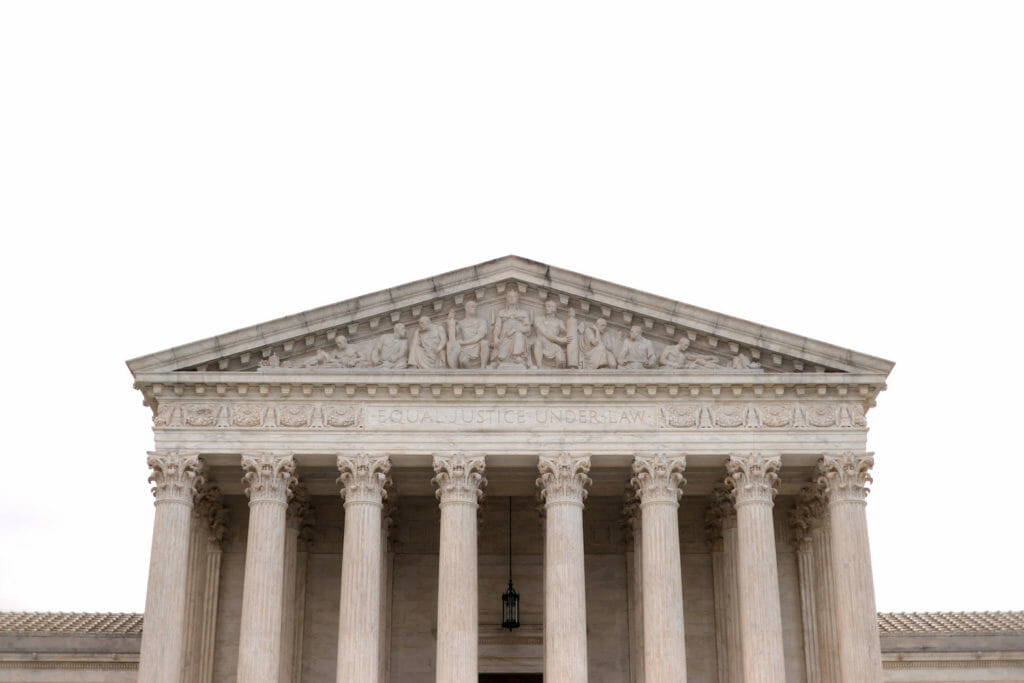U.S. Supreme Court backs public money for religious schools

A general view of the U.S. Supreme Court building in Washington, U.S. October 13, 2021. REUTERS/Jonathan Ernst/File Photo
WASHINGTON -The U.S. Supreme Court further reduced the separation of church and state in a ruling on Tuesday endorsing more public funding of religious entities as its conservative justices sided with two Christian families who challenged a Maine tuition assistance program that excluded private schools that promote religion.
In the latest in a series of decisions in recent years expanding religious rights, the justices overturned a lower court ruling that had rejected the families’ claims of religious discrimination in violation of the U.S. Constitution, including the First Amendment protection of the free exercise of religion.
The court’s conservative justices were in the majority in the 6-3 ruling https://www.supremecourt.gov/opinions/21pdf/20-1088_dbfi.pdf, authored by Chief Justice John Roberts, with its liberal members dissenting. The decision built upon the court’s 2020 ruling in a Montana case that paved the way for more taxpayer dollars to flow to religious schools.
Maine’s program provides public funds for tuition at private high schools of a family’s choice in some sparsely populated areas of the northeastern state lacking public secondary schools. Maine required eligible schools to be “nonsectarian,” excluding those promoting a particular religion and presenting material “through the lens of that faith.”
Roberts wrote that Maine’s program “operates to identify and exclude otherwise eligible schools on the basis of their religious exercise.”
The Maine plaintiffs sought taxpayer dollars to send their children to two Christian schools that integrate religion into their classrooms and maintain policies against gay and transgender students and staff.
The First Amendment also prohibits government endorsement of any particular religion in what is called the “establishment clause.”
“Today, the court leads us to a place where separation of church and state becomes a constitutional violation,” liberal Justice Sonia Sotmayor wrote in dissent.
Powered by its increasingly assertive conservative majority, the Supreme Court has expanded individual and corporate religious rights. Its conservative justices have been receptive to claims by plaintiffs – often conservative Christians – of government hostility toward religion including in the educational context.
Conservative and religious advocacy groups have been seeking through the courts more access to public funding for religious education, including through voucher or tax programs giving parents choice outside public school systems.
‘RELIGIOUS INDOCTRINATION’
The liberal justices said Tuesday’s ruling forces states to fund religious education despite establishment clause concerns.
Sotmayor said the court in just the past few years has “upended constitutional doctrine, shifting from a rule that permits states to decline to fund religious organizations to one that requires states in many circumstances to subsidize religious indoctrination with taxpayer dollars.”
Liberal Justice Stephen Breyer wrote that state funding of religious activity risks causing societal “strife” as some might view the government as favoring one religion over another, or religion over nonreligion – problems the Constitution was designed to prevent.
“Taxpayers may be upset at having to finance the propagation of religious beliefs that they do not share and with which they disagree,” Breyer wrote, adding that believers in minority religions with too few members to establish schools might see injustice in public funds going to adherents of more popular faiths.
Roberts said the court has previously held that states need not subsidize private education, but because Maine chose to do so it cannot disqualify religious schools. Maine has other options, Roberts added, including expanding its public school system.
President Joe Biden’s administration had backed Maine in the case.
The Supreme Court’s 2020 Montana ruling, which involved an educational tax credit, prevented states from disqualifying schools from public aid based on their religious status or affiliation. The Maine ruling went further.
Two sets of parents – David and Amy Carson, and Troy and Angela Nelson – sued Maine in 2018.
The Nelsons have said they wanted to use the tuition aid to send their son to a Christian school called Temple Academy in Waterville, but instead used it to send him to a secular private high school. The Carsons have said they paid out-of-pocket to send their daughter to Bangor Christian Schools in Maine’s third-largest city.
The two schools describe themselves as seeking to instill a “Biblical worldview” in students, according to court records. They refuse to hire gay teachers or admit gay and transgender students. Bangor Christian Schools teaches that a “husband is the leader of the household” and includes a class in which students learn to “refute the teachings of the Islamic religion with the truth of God’s Word.”
The families were represented by the libertarian legal advocacy group Institute for Justice.
In another religious rights ruling, the justices on May 2 backed a Christian group that sought to fly a flag emblazoned with a cross at Boston city hall. They are due to rule by the end of June in a case involving a Christian former high school football coach in Washington state who refused to stop leading prayers with players on the field after games.

